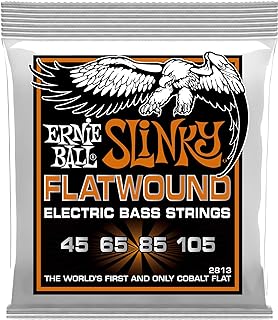5 important factors worth considering when looking for the best flatwound bass strings
When you’re picking out flatwound bass strings, it’s important to think about a few important things to make sure you find the right ones for your musical style and what you like. The size of the strings, the materials they’re made of, and how they’re made all affect how your instrument sounds, feels, and plays. If you pay attention to these important details, you can discover new sounds and have a better time playing your instrument.
See our guide to the best flatwound bass strings.
Material
When buying flatwound bass strings, the type of material you choose is very important. Steel is a popular option for its strong durability and bright sound, while nickel strings have a warmer tone and feel smoother. Each material has its own advantages, suiting different playing styles and music tastes. Steel strings are great for rock and metal music, giving a strong sound, while nickel strings are better for jazz and blues with a mellower tone.
Your choice of material also affects how long your flatwound bass strings last and how much maintenance they need. Steel strings are less likely to rust or wear out quickly, making them a good choice for musicians who play a lot or play hard. On the other hand, nickel strings may need to be changed more often to keep their sound and feel at their best. Understanding the trade-offs between durability and tone can help you find the right balance that matches your style and budget.
Whether you value longevity or sound quality more, the material of your flatwound bass strings is key in shaping your musical experience. It’s important to think about your musical needs and preferences before deciding which strings to buy.
Gauge
When it comes to choosing flatwound bass strings, the thickness, or gauge, is important for how your bass sounds and feels when you play. Lighter gauges are good for fast playing, like in fingerstyle music, while heavier gauges give a deep sound, especially for low notes. It’s important to find the right balance between gauge and your preferences for the best tone and playability.
Some people think lighter gauges are easier to play, but heavier gauges can give a strong, punchy sound that really resonates with the bass. Trying out different gauges lets you explore different sounds and find what works best for your music. The gauge you choose should match your playing style and the sound you want, leading you on a creative journey with your music.
Tension
The tension of flatwound bass strings affects how they perform and feel. Low-tension strings are smooth and comfortable, great for relaxed music styles. High-tension strings have a strong sound and sustain, perfect for a punchy tone. Knowing how tension affects your strings is important for customizing your setup to match your style. Finding the right balance between tension, feel, and tone is a journey every bassist must take to improve. Trying different tension levels helps you find your unique sound and customize your instrument for your artistic expression. Whether you like the ease of low-tension strings or the power of high-tension strings, exploring tension when buying bass strings shapes your sound and your connection to the music you play.
Coating
When you’re thinking about buying flatwound bass strings, keep coating in mind. A good coating makes the strings easier to play, last longer, and improves the sound of the instrument. Coated flatwound bass strings can make playing smoother by reducing finger noise and friction, so you can move along the fretboard effortlessly. This leads to more comfortable playing, improves your technique, and gives a more polished and professional sound, especially for music styles that need a warm and mellow tone.
Additionally, getting coated flatwound bass strings can be a smart decision in the long run. The coating protects against damage and corrosion, making the strings last longer and reducing the need to replace them often. Choosing coated strings ensures consistent performance and sound quality over time, saving you time and money while keeping your sound consistent with your musical needs. In conclusion, when you’re buying flatwound bass strings, picking coated ones is a good idea. It improves playability and sound, and guarantees durability and cost-efficiency in the long term.
Brand
When it comes to buying flatwound bass strings, the brand you choose is important. Some people think all brands are the same, but I believe the reputation and skill of a brand are crucial. Brands like D’Addario, Ernie Ball, and La Bella have been making high-quality flatwound strings for years, earning the trust of musicians around the world. These brands make strings that improve the sound of your bass and are reliable on stage or in the studio.
The brand you pick says a lot about your style and what you like. Choosing a well-known brand means you are joining a community of musicians who trust and recommend the same products. Even though lesser-known brands may be cheaper, risking the quality of sound, playability, and durability is not worth it. In the end, spending a little more on reputable brands for your flatwound bass strings is an investment in your music journey, ensuring a mix of tradition, creativity, and top performance.
Conclusion
In a world where sound is crucial, flatwound bass strings are known for their smooth and rich sound. They have a long history and offer a range of tones, from deep lows to warm highs, that musicians love to explore. These strings are perfect for playing classic rock or jazz, appealing to those who want to mix tradition with new ideas in their music. Want more info on mink cluster lashes, check the best mink cluster lashes.
